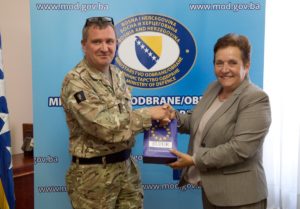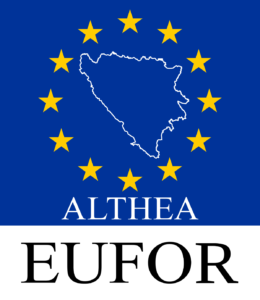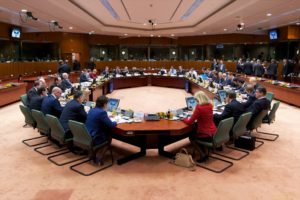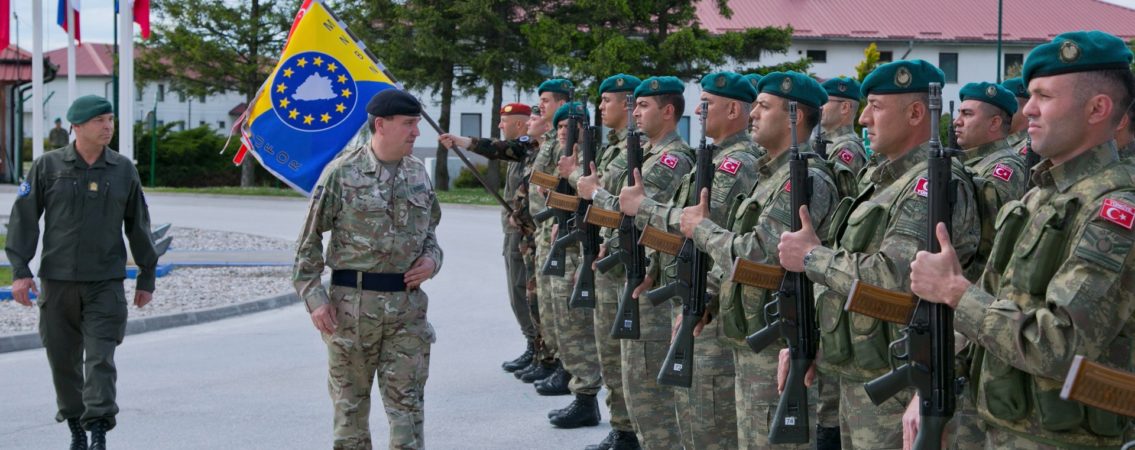The series of events following the breakup of Yugoslavia in 1992 led to a civil war between religious and ethnic groups; Croats, Muslims, and Serbs. The war brought violent crimes including mass rapes, mass murders, systematic destruction of the territory, and ethnic cleansing. With the help of external intervention, the war was brought to an end.
International Alert and Saferworld in 2004 reported that the security situation in Bosnia and Herzegovina was “Stable but still fragile”. However, there was a slow economic recovery which raised concerns about impending security problems especially the potential rise in corruption and criminality.

the Operational Commander of EUFOR Operation Althea
To ensure further stability, Operation EUFOR ALTHEA (a name derived from the Greek goddess known for healing) was launched on December 2 2004 to take over from the NATO –led operation SFOR which operated in the region to ensure stability between 1997 and 2004. The transfer of responsibilities was under the Berlin Plus agreement terms.
Even though NATO has handed over the stabilization responsibility to the EU, they still maintain a military headquarters in Sarajevo. Operation ALTHEA’s main effort is to ensure safe and secure environment (SASE) so that the reoccurrence of violence can be averted. The transition from SFOR to EUFOR is more of a nomenclature change because eighty percent of the troops remained in place.
Operation ALTHEA remains one of the numerous comprehensive approaches EU is taking towards socio-economic, political, and security stabilization of Bosnia and Herzegovina and this fits into the overall stabilization plan slated for the Western Balkans.

The initial configuration was slated for 1,300 troops. Due to their lack, the operation has reconfigured gradually leading to the reduction of the number of troops by more than half on 1 September 2012.
Notwithstanding that the number of troops has now been reduced to 600, they get back up from the Immediate Reserves at Troop Contributing Nations ready to be deployed to Bosnia and Herzegovina if the need arises.
Operation ALTHEA’s mandate is tied to the mandate of the UN Security Council mandate which is reviewed annually. The UN Security Council resolution 2315/2016 on the 8 of November 2016 agreed that Operation ALTHEA be extended by a year, that is, November 2017.

The Council of the EU has also concluded its readiness to sustain the Operation ALTHEA which includes sustaining the executive military role in the preservation of security and stability in the region following the renewed mandate by the UN. The Council of the EU also recognized the importance of coordinating the EUFOR ALTHEA operation with other international actors.
The Council also mandated institutions in Bosnia and Herzegovina to step up efforts concerning independence and functioning of the judiciary, fight against terrorism, fight corruption and organized crime, and prevention of radicalization.
Last month’s election rhetoric and pre-election agenda slowed the reform process and had a negative impact on the country’s political climate. Since the inception of the common Security and Defense Policy, Operation ATHLEA remains the longest running military operation of the EU.
In the first few years of Operation ALTHEA, EU reported improvement in BiH that the concerned authorities are now taking more responsibility. The European Council stated in 2003 that,
“The future of the Western Balkans (including Bosnia and Herzegovina) is within the European Union. EU integration is one of the main political objectives of Bosnia and Herzegovina.”
Source: Qcea
The reduction in military presence in Bosnia and Herzegovina has been due to positive assessment of the Operation ALTHEA. The information from the European Union Commission website said,
“The establishment of a Stabilisation and Association Agreement is crucial for Bosnia and Herzegovina’s aspirations to be part of the EU. It is expected that the perspective of negotiating and concluding this agreement will act as an incentive for the acceleration of the reform process in Bosnia and Herzegovina.”
Source: Qcea
The main objectives of the ALTHEA Operation include;
- Providing the Armed Forces of Bosnia and Herzegovina with capacity-building and training.
- Providing support to the entire strategy set out by the EU for Bosnia and Herzegovina
- To maintain a secure and safe environment for Bosnia by providing support to all the efforts on ground geared towards that process.
The ALTHEA Operation maintains its presence in Bosnia and Herzegovina through Liason and Observation Teams (LOT). The manoeuver units of the military is based in Sarajevo and Camp Butmir and made up of troops from Hungary, Austria, and Turkey.

